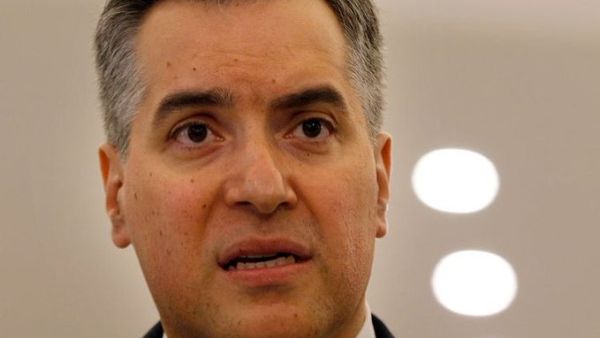Prime Minister-designate Mustapha Adib’s decision to step down from forming a new government threatens to plunge Lebanon into an open-ended political crisis if rival factions stick to their unyielding positions on the Cabinet deadlock, an official source said Sunday.
Adib’s dramatic move, which has also dealt a heavy blow to the French initiative aimed at rescuing the country from a series of multiple crises, came nearly a month after the premier-designate’s attempts to pull together a small Cabinet of independent specialists hit a deadlock mainly over who controls the Finance Ministry and who names potential ministers.
In addition to a nationwide negative backlash internally that immediately sent the already collapsing Lebanese pound plummeting against the U.S. dollar, Adib’s decision has also sent shockwaves in France, which is emerging as the main power broker in Lebanon since last month’s deadly explosion in Beirut.
A source close to French President Emmanuel Macron told Reuters Saturday that France would not let Lebanon down. "Adib stepping down amounts to a 'collective betrayal' by Lebanese political parties," the source said, clearly reflecting Paris’ frustration with Lebanese political leaders who had promised Macron to facilitate the formation of a new government within 15 days when he visited Beirut on Sept. 1.
“There are fears that the country might enter into an open-ended political crisis if the two sides – the two Shiite groups and the four former premiers – do not budge on their intransigent positions, which led Adib to step aside,” the official source told The Daily Star.
Asked who was to blame for Adib’s decision to step down, the source said the two main Shiite groups, the Amal Movement and Hezbollah, and the four former premiers who had nominated Adib to form a new government.
“Adib’s decision to step down has taken Lebanon, already reeling from a severe economic crisis, into the unknown, with all the dire economic, security and political repercussions it entails,” Future Movement MP Mohammad Hajjar told The Daily Star Sunday.
He said the Shiite parties, along with their allies the Free Patriotic Movement, bore responsibility for Adib’s resignation. Hajjar denied media reports quoting former Prime Minister Saad Hariri as saying that he would not name any candidate for the premiership.
Hariri said Sunday he would not be the next prime minister, while maintaining his support for the French initiative. “In view of what is circulating in the media, the media office of former Prime Minister Saad Hariri stresses that he is not a candidate for the formation of the new government,” a statement released by Hariri’s media office said.
“However, he maintains his position of supporting the initiative of French President Emmanuel Macron and of facilitating anything that could make it succeed, because it is the only and last opportunity to halt Lebanon’s collapse,” the statement added.
Reacting to Adib’s decision, Hariri said those who applauded the failure of the French initiative would regret “wasting an exceptional opportunity ... to stop the economic collapse and put the country on the path of required reform.”
“Once again, the politicians in Lebanon present to our friends around the world a blatant example of failure in managing public affairs and approaching the national interest,” Hariri said in a statement Saturday. He added that there was no need to name those who obstructed Adib’s Cabinet formation efforts “because they exposed themselves internally and externally.”
Since his designation on Aug. 31 as prime minister, Adib has pledged to form a small 14-member Cabinet made up of independent specialists, who can work on enacting urgent reforms needed to unlock promised international aid to pull the crises-ridden country out of its worst economic and financial crisis since the 1975-90 Civil War. The crisis has been compounded by the Aug. 4 explosion that pulverized Beirut Port and the increasingly alarming surge in coronavirus infections.
Hariri and the three other ex-premiers – Najib Mikati, Fouad Siniora and Tammam Salam – have staunchly supported Adib’s push for a small Cabinet made up of specialists who are entirely independent of political parties. They also backed Adib’s proposal for a rotation of the four sovereign ministries – Finance, Defense, Interior and Foreign Affairs.
But Parliament Speaker Nabih Berri and Hezbollah are adamant on retaining hold of the Finance Ministry. Berri, the Amal leader, backed by Hezbollah, insists that the Finance Ministry be excluded from Adib's proposed shake-up of the leadership of the four sovereign ministries. The Finance Ministry has been led by a Shiite since 2014.
Hariri sought to break the Cabinet impasse by proposing Tuesday that Adib name an "independent" Shiite candidate for the Finance Ministry. But the proposal failed to make the Shiite parties budge on their tough stance. The two groups also insisted on naming Shiite ministers in the new Cabinet, which runs contrary to Adib’s stance to select by himself members of his Cabinet.
In his resignation letter he presented to President Michel Aoun Saturday, Adib cited what he called the “lack of consensus” on whose basis he accepted to form a new government. “Since a [Cabinet] lineup under the specifications I had put was doomed to failure, and out of my keenness on national unity, I apologize for not continuing the mission to form the government,” he said.
Afterward, a statement issued by the presidency said Aoun accepted Adib’s resignation and that the president would take “appropriate measures in accordance with the requirements of the Constitution.”
A source at Baabda Palace ruled out the possibility of Aoun holding binding consultations with parliamentary blocs next week to name a new prime minister.
“The president is currently assessing the situation following Adib’s decision to step down before deciding the next move,” the Baabda source told The Daily Star. He said there was a possibility that Aoun would confer first with parliamentary blocs to reach a consensus on a new prime minister before setting a date for the binding consultations to name a candidate to form a new government.
Despite Adib stepping aside, the source said that the French initiative was intact. Under the French road map presented by Macron to Lebanon’s political leaders, the new government would carry out reforms and take measures to fight endemic corruption, curb waste of public funds, and overhaul the country’s ailing electricity sector, which bleeds the cash-strapped state Treasury around $2 billion annually.
Implementation of long-overdue key reforms is needed to unlock promised international aid to the country, avert a total economic collapse and cope with the grave consequences of the Beirut Port explosion that left swaths of the capital in ruins. The blast, the biggest in Lebanon’s history and caused by the detonation of 2,750 tons of ammonium nitrates, killed at least 192 people, injured thousands, left 300,000 people homeless and caused losses worth billions of dollars.
Despite Adib stepping down, Hezbollah and the Amal Movement have both said they are committed to the French initiative. "Our position is to stick to the French initiative and its content," Berri said in a statement Saturday.
Maronite Patriarch Bishara al-Rai renewed his call for not allocating any key ministerial portfolio to any sect, taking an indirect spike at the Shiite groups for insisting on retaining the Finance Ministry.
Speaking in Sunday’s sermon at his summer residence in the northern town of Diman, Rai said Adib’s decision to step down presented the country with “several dangers, the least of which is the absence of a government to spearhead the process to save the country, address international conferences and negotiate with the International Monetary Fund [on a $10 billion bailout package].”
Thanking France for its initiative, Rai said: “We call for not allocating any ministerial portfolio to any side, party, sect or confession permanently, but for the adoption of the basis of a democratic rotation.”
This article has been adapted from its original source.








